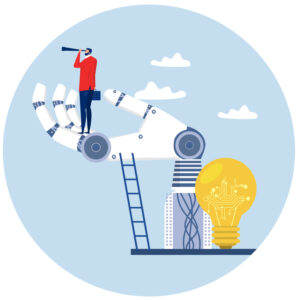A Delicate Equilibrium
While digital know-how remains an extremely important aspect of almost every sector, it’s indisputable that there’s much more to the financial services skills mix needed today and tomorrow than tech insight.
 By Chartered Banker, UK
By Chartered Banker, UK
If most of us were asked to close our eyes and picture what job roles would look like in the future, the chances are they would resemble something from the 2002 tech-noir film Minority Report. Think the likes of gesture-controlled computer interfaces and ubiquitous large-scale digital displays.
While there’s no denying that this is the direction that we’re heading in – and fast – this way of thinking might greatly underestimate the necessity for certain mindset and attitude-related skills that will keep customer-service-centric sectors – such as financial services (FS) – afloat.
In fact, Claire Tunley, Chief Executive, Financial Services Skills Commission (FSSC), is firmly of the opinion that within FS, the future is far from a complete focus on tech and digital. “It’s about the behaviours and capabilities that sit beneath those,” she says. “These are absolutely necessary in order to be able to apply the relevant tech.”
Tunley comments on a recently launched FSSC report called People + Technology. “It’s all about how skills can unlock value for financial services,” she says. “We spent a lot of time thinking about the title. I think it was Reid Hoffman (American internet entrepreneur and co-founder of LinkedIn) who said, “It’s not people or technology, it’s people plus technology”.
She continues: “We’ve been on this journey for a while, but what we’ve always done is work with firms to understand where their skills needs are. Now, that took a bit of time because we had to ask firms to forecast their skills and improve how they’re looking at their future skills needs, which we’ve done using some specific tools. But what we’ve come out with is a set of 13 future skills – seven technical skills and six behaviours – and what is interesting is that the behaviours have very much been prioritised as much as the technical skills.”
The vital technical skills that came out on top were data analysis, digital literacy, software development, cybersecurity, and machine learning (ML). Meanwhile, the core human skills firms are prioritising were empathy, adaptability, creative thinking, and coaching.
Tunley explains that some skills were added at later dates. “In the first phase, we had teamwork, relationship management, and adaptability,” she recalls. “These all came from our members, which is important. They told us that these behaviours underpin success in their work – and this includes ML or artificial intelligence (AI), or customer journeys and user experience.
“Coaching and creative thinking were added a year later because companies were telling us that more was needed in these spaces – that they needed to think creatively and have more innovation.”
She states that all of the skills can be applied in different ways to different roles and across different themes. “So, for example, if you’re thinking about green finance and the race to net zero, relationship management comes out strongly alongside the likes of data analytics because if you think about bringing customers and clients on that very specific journey, that relationship management expertise is vital. What firms have been telling us is that there’s a bit of a gap here and, as such, they need to invest in that behaviour.
“There is a challenge, though, in the fact that the sector is so focused on tech. It’s so prevalent and that’s not going away. We need to build skills in all of these areas, and we actually need to integrate the capabilities and understand the expertise in terms of human behaviours.
“There’s a piece of research that we did with executive search company Odgers Berndtson, one of our advisory group members,” Tunley continues. “It’s still really relevant even 18 months later.
“It looks at what the skills gaps are at board or C-suite level. It’s really interesting. Obviously, tech skills were up there, but crucially, so were behaviours like empathy.”
Clare Buxton, Partner, Heidrick & Struggles, an executive search firm, explains how she and her colleagues approach looking for leaders in FS. “What we’re always looking for is an unwavering focus on the customer, the ability to innovate, technical understanding, and commercial understanding. But it’s also vital to be able to juggle all of these pieces at the same time.
“In fact, one executive in a client organisation described this to me as a triad of competencies – the commercial abilities, the focus on the customer, and the technological understanding. It’s about trying to find executives that really speak to all three of those.”
Tunley talks about a not-too-dissimilar approach. “For the report that we recently launched, we interviewed 45 senior leaders and then conducted some analytics around their answers. The result was a Venn diagram.
“There are technical capabilities, financial services expertise – because let’s not forget, there’s a lot of deep expertise in the FS sector – along with behavioural skills and behaviours. Where these three circles intersect is the sweet spot.
“There is a need to drive towards that because we no longer work in a way where one department does X, and another does Y. That’s just not the case now.
“Everything needs to dovetail together because we don’t operate in isolation any more. Instead, there needs to be purpose around realising where a business needs to grow, develop, and build that depth of skills and expertise. That integration is where the success will be.”
In a 2023 Accenture Financial Services global study of nearly 33,000 banking customers spanning 18 markets, 49% of respondents indicated that customer service drives loyalty. Therefore, by knowing the customer and engaging with them accordingly, it’s thought that financial institutions can optimise interactions that result in increased customer satisfaction and wallet share, subsequently decreasing customer churn.
Buxton believes that key to this is perfecting a delicate equilibrium. “It’s about trying to balance subject matter expertise with a real eye on the customer and an underlying understanding of technology – because that is just so fundamental to the way banking is going.”
She says that when they assess leaders, they do so based on experience and expertise. “We’re looking at how they lead today, what their track record is like, what their leadership style is, and how they are impacting their current organisation.
“It’s hard to take into account all these aspects, but we’ve developed many tools and we think we do a good job of this. It’s also about agility and the future. We are not just looking for where they’ve been, but we are also looking for their ability to respond to the unknown and react to whatever might be thrown our way in 2024 and beyond.
“Then there is the cultural aspect as well, which is where the purpose piece comes in. We are having to assess talent around not just what they have done and where they were, but also what they’ve done since then to upskill themselves, how agile they are, how curious they are, and how much they are seeking out new opportunities as well as responding to old ones.”
In terms of tools, Tunley refers to a Future Skills framework, which includes proficiency levels, that the FSSC has pioneered with NatWest. “Taking relationship management as an example, there is a breakdown of what’s good within relationship management behaviour. We have four domains: understanding customer needs, building trust, communication, and partnership. Of course, some of these will cross over into others. They don’t all stand in isolation.
“Then we’ve identified detailed proficiency levels, one to five and what can be done at each level. At level one, people demonstrate they can address simple queries and draw basic conclusions – and this goes all the way up to level five, which includes using industry knowledge to identify changes in the market that will impact on customer needs. Firms are using this framework to assess where they need to be upskilled.
“They might, for example, identify a role that needs to be more about relationship management and therefore needs people with level-four proficiency. And they might need to be a level three on cybersecurity or ML, too. And that might lead them on to realise that they have level-three people who can be progressed. So, firms can be really specific about where that development needs to be.”
She says that this removes some uncertainty and guesswork. “Because if you ask someone, ‘what does a relationship management skill look like?’, you’ll get different answers. We developed this with our members and we’ve tested it with them so that we know that this works.
“What has also happened is external organisations like chartered bodies – such as the Chartered Banker Institute – and colleges have been developing courses off the back of this. They know what the learning outcomes they’re aiming for are because we’ve defined them – and then they can actually move towards delivery.
“This work is ongoing, too,” continues Tunley. “We’re constantly asking firms, ‘Is this still relevant? Is anything new popping up? Is there anything that is in here that we need to remove because it’s no longer applicable? How do we keep this up to date?’ And they’re able to say that X is important to them and what they’re going to keep developing in terms of skills.
“Of course, the 13 future skills that we prioritise are not the only skills people need to work in the sector, but they are the ones that firms have told us about and as such they are the ones that are priorities for us. We can see that there are acute skills shortages or that there’s a growing gap – and that they are where we need to put our focus. That doesn’t mean to say the other ones are not relevant, of course.
“I think there are areas of FS knowledge and expertise where firms are realising that they will lose talent – especially around some very detailed, complex areas of knowledge within, for example, pensions. There might be a few hundred people in the country that have an in-depth understanding of this area, and half of them are going to retire in the next five years.
“That is a skills challenge of a different order. But through our work, making firms think about that now, means that they can do something about it.”

FS is likely to be the sector that experiences the largest transformation from AI, given its high volume, tech-based and data-driven nature and its penetration to this point.
Potential enhancements to aspects of the FS sector could include:
The integration of AI tools and insights will change the tasks the sector requires people to undertake and the skills they need to deliver. The shift will create a culture that teams humans with AI. The skills that will be required for this include:
This article previously appeared in the Chartered Banker magazine, UK, Issue 1 2024 edition.